If you are planting a garden this summer, growing herbs can be good for your health. There are many natural bug repellent plants available to help turn your yard into a bug-free zone naturally. Or to keep them off your skin when used in DIY natural bug repellents. Herbs that keep bugs away are awesome… because bug bites are itchy and annoying, not to mention they can sometimes be dangerous.
Mosquitoes can carry diseases like Zika virus, malaria, and dengue fever. Ticks can transmit Lyme disease. And fleas can cause tapeworms. Spider mites will wreak havoc on your garden.
As you can see, plants that repel insects are great to have around. And when they are edible herbs, they are doubly beneficial. As a natural bug repellant as well as a delicious addition to your next meal. Yes, you can have lavender mosquito repellant as well as lavender shortbread cookies!

Herbs that keep bugs away are a natural and safe way to protect yourself from disease-causing pests. And they also protect tomato plants from tomato hornworms. Plus, making your own bug repellant is easy and affordable.
In this article, I share the best herbs that keep bugs away from you and your yard as well as a few simple recipes for DIY bug repellants.
Table of Contents
Herbs That Repel Bugs
So, you want to plant an herb garden that is both delicious AND useful, right? Whether you want to make your own natural bug repellant or keep squash bugs out of your vegetable garden, herbs can help.
Companion planting herbs and other food crops will keep many insects away from your vegetable plants. And many of these insect repelling plants also cut down on the mosquitos and other bugs that annoy us while we are out in the yard.
Here are a few herbs that keep bugs away from you, your family, and your backyard space.

✯Don’t want to miss the next post?✯
Follow Turning the Clock Back on Facebook | Twitter | Pinterest
Or join the private Facebook group for simple tips on going green!
Basil
Known for its versatility in the kitchen, basil (Ocimum basilicum) is a popular herb that can also be used as a natural mosquito repellent.
A member of the mint family, basil has a strong aroma that helps to deter mosquitos and other insects.
In fact, studies show that basil essential oil is just as effective at repelling mosquitos as DEET, a common chemical found in insect repellents. (check out Malaria Journal for more info)
In addition to its bug-repelling properties, basil is also an excellent source of antioxidants and vitamins A and C. So, the next time you’re looking for a natural way to keep bugs at bay, reach for some basil.
You will find fewer pesky bugs in the garden AND get to enjoy its bold flavor in my watermelon and basal salad recipe. And don’t worry.
Growing basil plants is incredibly easy. Keeping bugs off basil plants in the garden is EASY because they don’t generally even bother it!
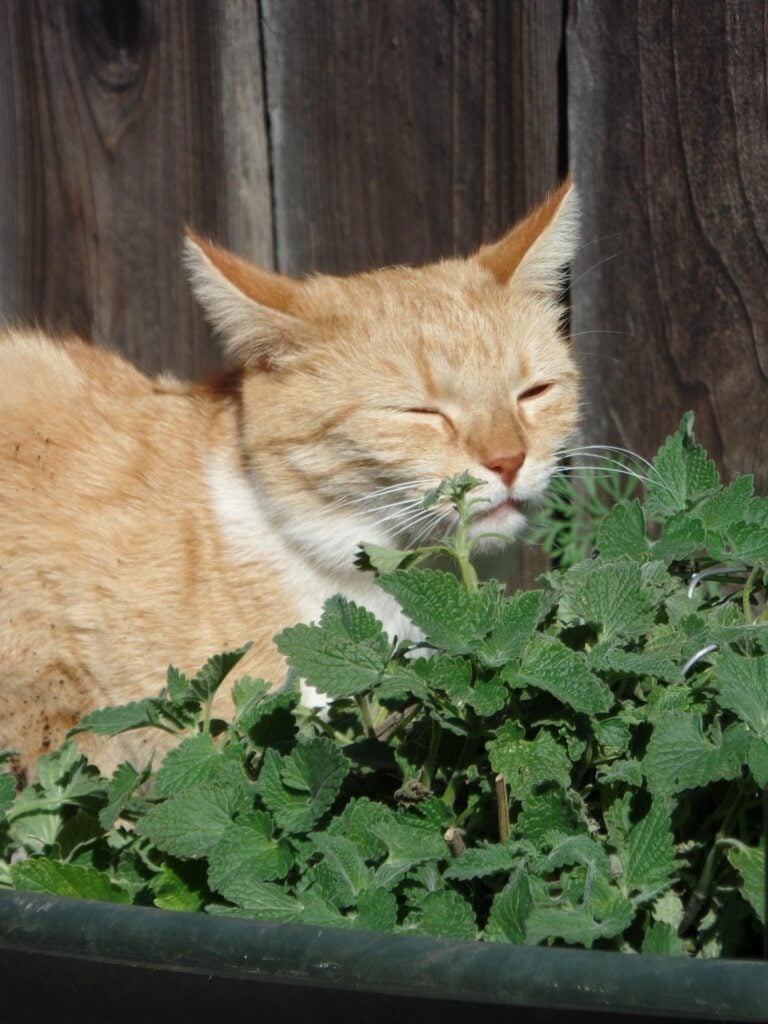
Catnip
It’s a question that many cat lovers have asked: Does catnip repel bugs? The answer, unfortunately, is not clear-cut.
Some studies show that catnip does indeed repel certain insects, while other studies claim that it has no effect whatsoever. So what’s the truth?
Unfortunately, there is no easy answer. It seems that the jury is still out on this one. However, there are a few things we do know about catnip and its potential as a bug repellent.
First of all, catnip does contain a chemical called nepetalactone, which has been shown to be effective at repelling certain insects, including mosquitoes.
In fact, nepetalactone, the essential oil in catnip that gives the plant its characteristic odor, is about ten times more effective at repelling mosquitoes than DEET. (Check out this article in Science Daily for more info!)
Additionally, some studies have shown that when catnip oil is diluted and applied to the skin, it can help to repel deer ticks.
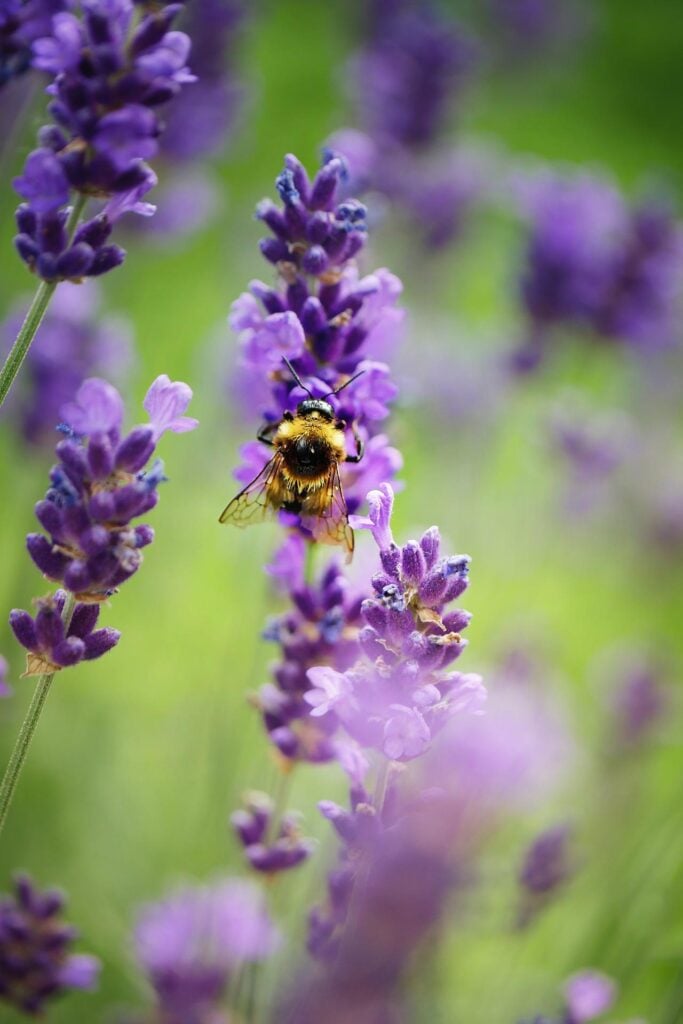
Lavender
Lavender is a popular plant known for its distinct aroma and pretty purple flowers. Many people enjoy growing lavender in their gardens for its aesthetic appeal and pleasant scent.
There has been some research conducted on whether lavender is also a mosquito repellent plant, however, the results are mixed.
Some studies have found that lavender does indeed keep bugs away, while other studies have found that it does not.
If you’re interested in planting lavender in your yard as a mosquito repellent, there are a few different ways to use it.
You can grow lavender plants in your garden and rub the plant on your skin to keep mosquitoes away.
You can also make a lavender-infused oil or lotion to apply to your skin. Lavender essential oil can also be used in DIY mosquito repellent recipes.
While lavender may or may not be an effective mosquito repellent, it’s definitely worth giving it a try! Worst-case scenario, you’ll end up with a beautiful plant in your garden that smells amazing. (And if you love lavender, check out my Lavender Oatmeal Milk Bath)

Marigold
Marigolds are one of the most popular choices for natural insect control. They grow easily in shallow soil that is poor to average in nutrients. They produce abundant, pretty flowers that release a compound called pyrethrin, which is toxic to many common garden pests.
While you may think of marigolds as just pretty flowers, it is actually classified as an herb. In terms of repelling pesky bugs, marigolds are most effective against flying insects, however, they can also help to deter crawling bugs and even keep animals out of the garden.
In addition to their pest-repelling properties, marigolds are also easy to grow and make a lovely addition to any herb garden.
So, if you’re looking for a natural way to keep insects out of your yard, consider planting some marigolds in between your other plants.
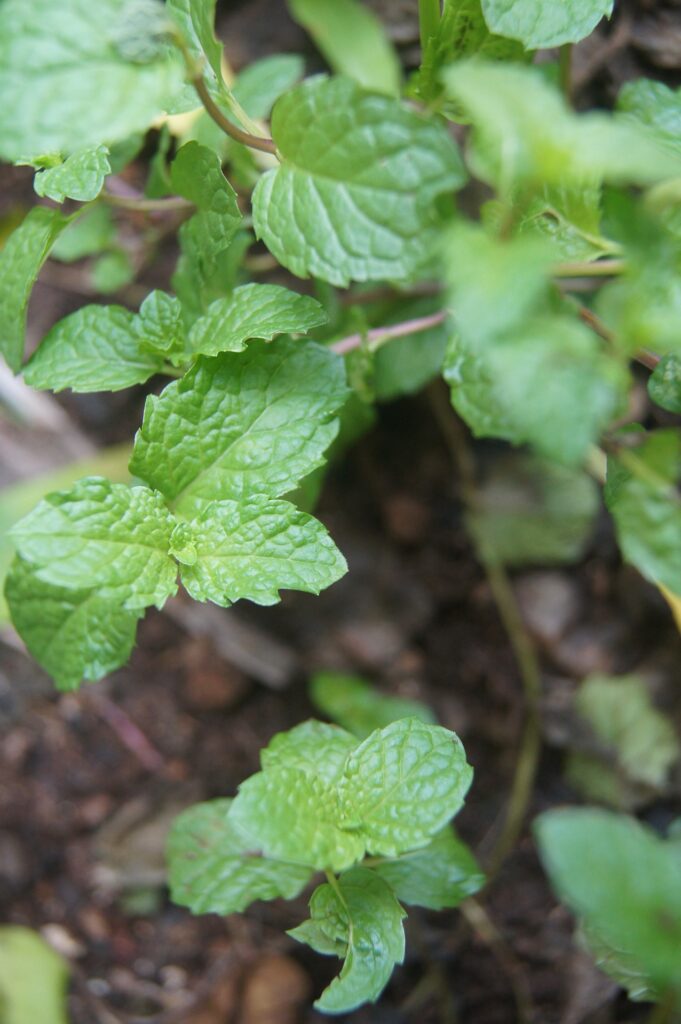
Mint
There are a number of plants that have been traditionally used as natural insect deterrents. Mint is one of them.
The strong smell of mint is thought to mask the scent of humans, making it difficult for mosquitoes and other insects to find us.
Mint is also a known insecticide and can be used to deter a wide variety of pests. However, it should be noted that mint only repels insects; it does not kill them.
Like all companion planting, growing mint s best used as a preventative measure, rather than as a treatment for an existing infestation. When used properly, mint can be an effective way to keep bugs away.
If you choose to plant mint, keep in mind that it is a rather aggressive spreader so find somewhere you can easily keep it contained. Hanging baskets or a flower bed with edging are two good choices.

Rosemary
Many people believe that rosemary is an effective insect repellent, and there is some evidence to support this claim.
In one study, volunteers applied a rosemary-based spray to their skin and found that it provided protection against mosquito bites for up to two hours.
However, it is worth noting that rosemary essential oil is very concentrated, and it can cause skin irritation if used directly.
When used in a diluted form, such as in a lotion or spray, rosemary may be an effective way to keep flies and mosquitoes away.
Check out my post on the many uses for rosemary because it is a fairly big plant and you will get TONS of it!

Sage
Does sage really repel mosquitos? There are a lot of old wives’ tales out there about how to keep mosquitos away. Many people swear by using products that contain sage, but does this method actually work?
Sage is a flowering plant in the mint family that is native to the Mediterranean region. It has a long history of use in cooking and medicine, and it is also a popular ingredient in many commercial insect repellents. Sage contains a compound called thujone, which is thought to be responsible for its mosquito-repelling properties.
Studies have shown that thujone does indeed have some insecticidal activity. However, it is not clear whether this is enough to make sage an effective mosquito repellent on its own.
When used in combination with other ingredients, such as citronella oil, sage may help to improve the efficacy of an insect repellent.
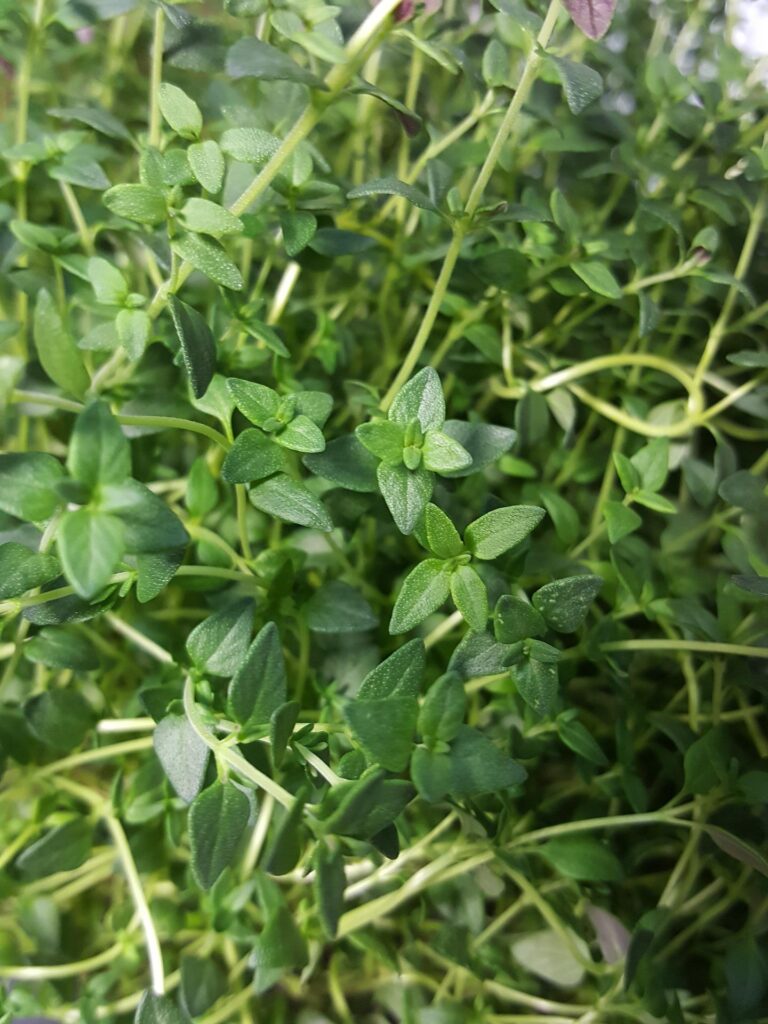
Thyme
Gardeners have long used herbs to repel pests, and thyme is one of the most effective. Thyme is a strong-smelling herb that does double duty in the garden: it not only repels bugs, but it also helps to deter rabbits and other small animals.
When planting thyme, be sure to choose a spot that gets full sun and has well-drained soil. Thyme does not like to be wet, so be sure to water it only when the soil is dry.
If you live in an area with hot summers, consider planting thyme in a pot so that you can bring it indoors during the hottest months. Mine will flower and look very stressed out if the temperatures get too hot.
Thyme is a versatile herb that can be used fresh or dried, and it makes a great addition to any garden. It comes in many varieties. I am particularly fond of the lemon thyme we usually grow.
When added to an array of other plants in your flower beds, you may find those pesky mosquitoes decide to find less fragrant places to live. Read my post on how to grow thyme for a few tips.
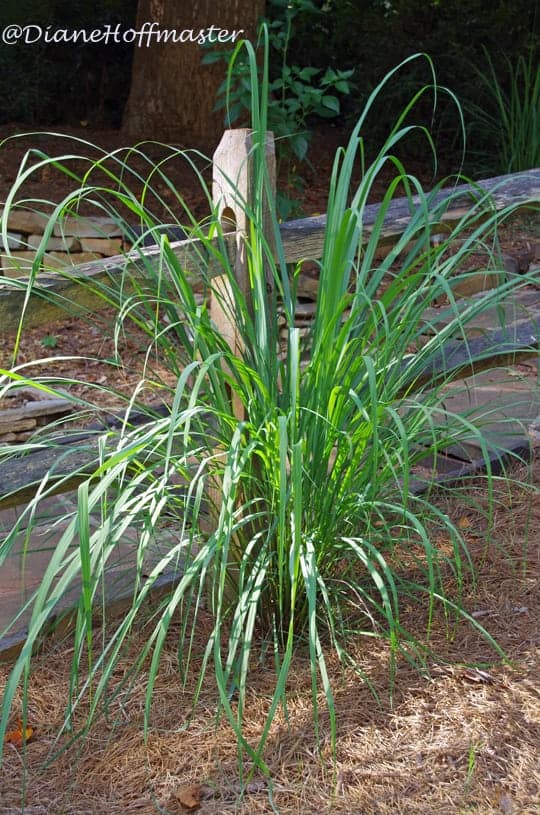
Lemongrass
Does lemongrass repel bugs in the garden? This is a common question asked by many gardeners. The answer is yes! It’s not just decorative grass. Its lemon-like fragrance makes this aromatic herb unpleasant to flies and mosquitoes.
Lemongrass is definitely a great natural insect repellent and can be used to keep bugs away from your plants. Here are a few ways to use lemongrass to repel bugs in the garden:
- Plant lemongrass around the perimeter of your garden.
- Crush up some lemongrass leaves and sprinkle them around your plants. The scent of the lemongrass will deter bugs like mosquitoes, Japanese beetles, fleas, fruit flies, and moths from getting close.
- Make a lemongrass spray by mixing water and crushed lemongrass leaves. Spraying this around your plants will repel bugs.
Lemongrass is a safe and effective way to keep bugs out of your garden. Give it a try next time you are looking for a natural insect repellent! Read my post on how to grow lemongrass for a few tips.

Garlic
Does garlic repel bugs in the garden? If you’re looking for a natural way to keep pests out of your garden, you may have considered planting garlic. But does garlic really work as a pest repellent? Let’s take a closer look at the science behind this age-old remedy.
It’s true that garlic does have some insect-repelling properties. The compound allicin, which is found in garlic, is a natural insecticide.
However, allicin is only released when garlic cloves are crushed or cut. So, if you’re growing garlic to repel pests, you’ll need to crush the cloves and spread them around your garden.
Allicin isn’t the only compound in garlic that can deter insects. Garlic keeps bugs away mostly due to the presence of sulfur compounds. Sulfer is known to repel many common garden pests, including aphids, cabbage worms, and Japanese beetles.
However, it’s important to note that not all insects are repelled by garlic. However, planting garlic near certain plants that are prone to investigations of Japanese beetles may be a wise move. Read my article on growing your own garlic to get started.
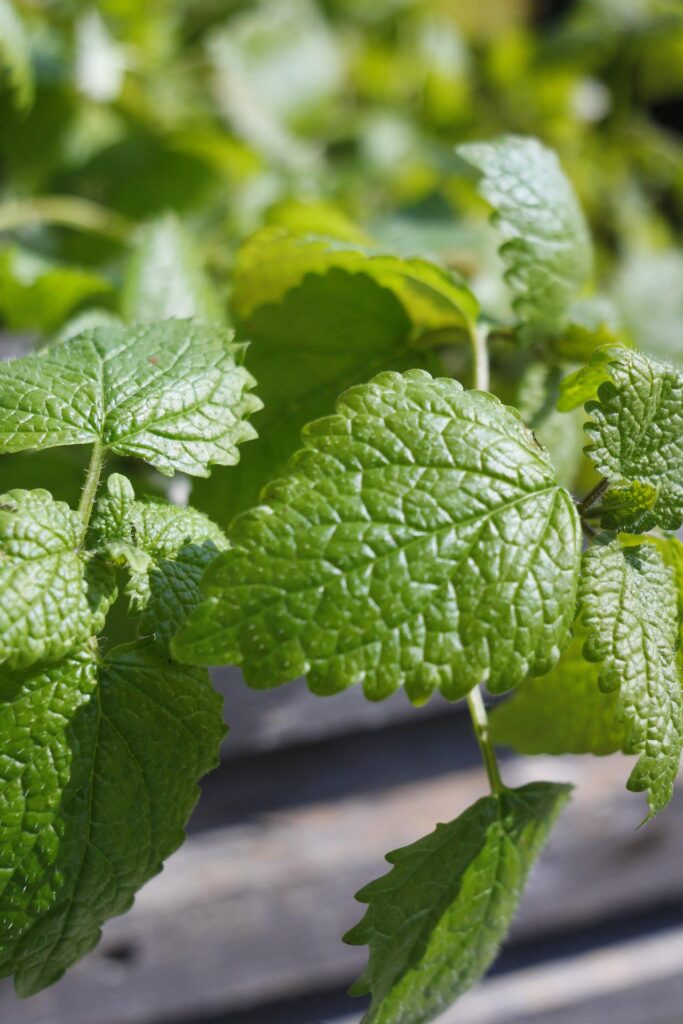
Lemon Balm
Lemon balm is a lemon-scented herb that is related to mint. It has been used for centuries in cooking and medicine.
Lemon balm is also known to repel some insects, making it a popular choice for gardeners who are looking for an environmentally-friendly way to control pests.
Some studies have shown that lemon balm essential oil can repel mosquitoes, but more research is needed to determine whether lemon balm is effective against other pests.
Check out my post on creative uses for lemon balm because it is a very prolific plant and you will have more than you could ever possibly need.
Other Pest Repelling Plants
There are other pest repelling plants as well, however, certain things like bay leaves and citronella grass are a little bit more finicky when it comes to where they will grow.
The herbs listed here have a fairly widespread growing range and are easy for the average homeowner to grow.

Tips for Using Plants for Pest Control
Whether you have squash bugs or carrot flies, there are many fragrant herbs that can act as bug repellents in the garden. When planted around the perimeter of your outdoor living space, they will help keep annoying insects away naturally.
How do these plants repel mosquitoes? They contain natural oils that bugs find offensive. When the oils are released into the air, they create an invisible barrier that bugs find offensive.
Not only are plants environmentally friendly, but they can also be very effective at controlling a wide range of pests. They also don’t kill beneficial insects like ladybugs, unlike conventional pesticides.
Here are a few tips for using plants for natural pest control in the garden:
- Choose the right plant for the job. Different plants are effective against different pests. For example, lavender is a great natural repellent for moths, while mint can help to deter ants and spiders.
- Plant strategically. Place pest-repellent plants in areas where you generally see pests, such as near doors and windows or in garden beds. You can also try planting certain crops together as a natural form of pest control. For example, tomatoes and basil make a great combination, as basil helps to repel tomato worms.
- Use natural sprays. If you have a serious pest problem, you can make a natural spray by mixing water with essential oils from pest-repelling plants. Just be sure to test the spray on a small area first, as some essential oils can damage certain types of plants. With these tips, you can effectively control pests in your home or garden using only plants!
If you find that you still have a problem with garden pests, consider using only natural pesticides like neem oil or diatomaceous earth. And plant flowers that attract ladybugs, which eat aphids or praying mantises which also keep bugs away from garden plants.

Keep Bugs Away With DIY Natural Bug Repellent
Of course, you can also use these herbs to make DIY bug repellents. Most of the herbs mentioned here are a great addition to your medicinal herb garden to repel insects from YOU as well as your outdoor space. Here are some tips for making your own natural bug repellent.
How to Make Bug Spray From Fresh or Dried Herbs:
To make a DIY bug repellent, simply steep 3 to 4 tbsp of dried herbs in 1 cup of boiling water until cooled. Strain, add 1 cup witch hazel or rubbing alcohol, and mix gently. Pour it into a spray bottle and use it before going outside to keep bugs away from your skin.
If you have only fresh herbs, double or triple the amount you use. You can buy a dehydrator to dry fresh herbs. We bought the COSORI food dehydrator and it is truly fabulous. It is seriously the best way to preserve fresh herbs.
If you store it in the refrigerator, it will be an incredibly refreshing spray on a hot summer day.
DIY Bug Repellent with Infused Oils
DIY bug repellents can also be made by infusing oils with these same herbs. Combine 1 cup of oil with 1 ounce of dried herb in a glass jar. As mentioned above, you can dry herbs easily in a food dehydrator or use several tablespoons of chopped fresh herbs instead.
Place the jar in a pan of water and heat over low heat until the oil is warm. Remove from heat and allow to cool.
Strain the oil and store it in a dark glass bottle. Apply to skin as needed. DIY natural bug repellents are safe and effective ways to keep bugs at bay.
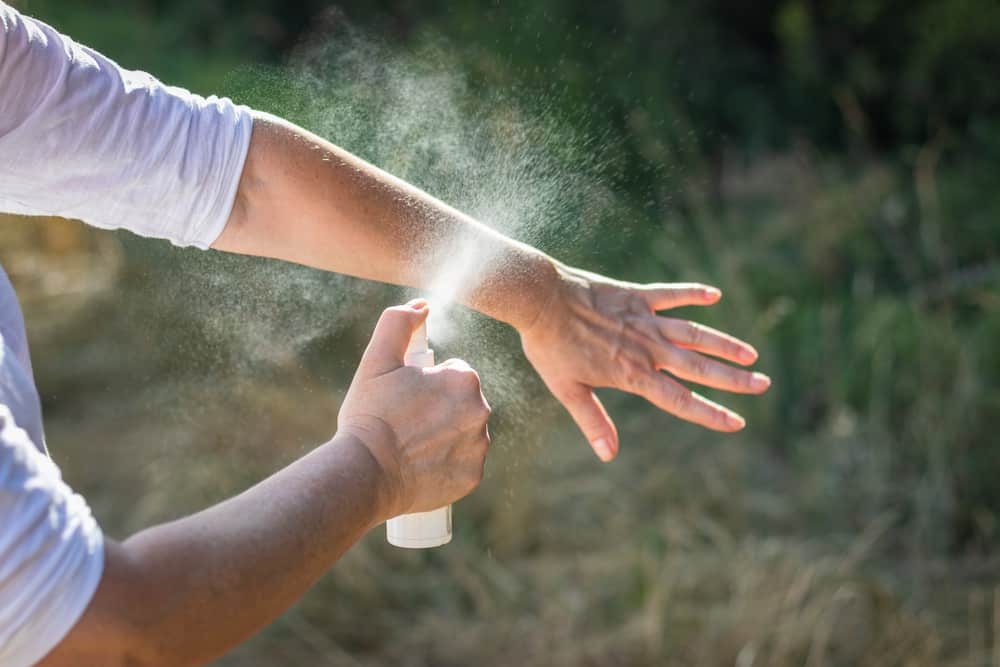
A Word of Caution about Topical Use
DIY insect repellents made with herbs can be effective and are generally considered safe. However, there are a few health concerns to keep in mind when using them.
First, some herbs can cause skin irritation, so it’s important to test a small area of skin before applying them more widely.
Second, DIY insect repellents may not be as effective at repelling insects as commercial products.
Finally, they should be reapplied more often than commercial repellents to maintain their effectiveness.
Overall, DIY insect repellents made with herbs are a safe and effective option for preventing mosquito and other bug bites.
However, it’s important to use them carefully and reapply them often to achieve the best results.
Herb Garden Supplies
Whether you want to plant lemongrass next to your outdoor rose bushes or repel flies from your outdoor BBQs, you need the right supplies to grow herbs in the garden.
Of course, you can also grow an indoor herb garden, if you don’t have space outside. Here are a few herb garden supplies to get you started:
- Check out Amazon for a wide variety of herbs, from basil seeds to several types of lavender seeds.
- Don’t forget to label everything with reusable copper garden markers. I also like to use microtip pruning sheers to cut fresh herbs.
- If you want to make your own DIY bug spray, don’t forget to get a glass spray bottle for applying it.
I hope this herb guide has been helpful. Please let me know how your herb garden does this summer! And remember, whether you want to grow herbs to ward off mosquitos or your goal is keeping bugs off vegetable plants, herbs are both tasty AND useful for the home gardener.

Diane is a professional blogger and nationally certified pharmacy technician at Good Pill Pharmacy. She earned her BS in Microbiology at the University of New Hampshire and has worked in cancer research, academics, and biotechnology. Concern over the growing incidence of human disease and the birth of her children led her to begin living a more natural life. She quickly realized that the information she was learning along the way could be beneficial to many others and started blogging and freelance writing to share this knowledge with others. Learn more about her HERE.


Are there herbs that help with flea control/get rid of inside the house instead of using pesticides?
Citronella, eucalyptus, peppermint, tea tree, and rosemary are all herbs that help repel fleas indoors.
Can that be sprayed on animals too?
I generally don’t recommend spraying anything on pets without asking your vet first!
We are struggling with roaches! I would love to use natural remedies to get rid of them.
We have a roach problem here in the south as well!